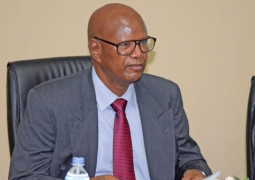
Fodeh Baldeh, known to the general public as a publisher, a linguist and a poet ("A Fate of an African President" 1995), holds a Bachelor's degree, a Diploma in Education and a Master's degree. His teaching career began in The Gambia and continued for more than twenty years in Nigeria, where he was an English teacher and examiner, especially for secondary school examinations. Upon returning to The Gambia, he began teaching at the University of The Gambia in the second semester of the 2003-2004 academic year.
In all African countries that use a European language as a teaching language (English, French, Portuguese, Spanish), the problem of mastering this linguistic tool arises students speak their mother tongue, and the ex-colonial language inevitably undergoes modifications as a result of the use that speakers make of it according to their cultures and needs. In these conditions, the task of the language teacher is not easy because he has to make the students acquire a language which allows them to be understood and to express themselves correctly in oral and writing as if they were in the country of origin of this language (England, France, Portugal...). The school is the place where the real level of use and mastery of the language is revealed, and it is there that the exact effort that must be made to maintain the standards and quality of the language is best measured.
This long experience of the gap between the practice of English (in Nigeria, Sierra Leone, Gambia) and its standard level led Fodeh Baldeh to write a 346-page book, published in 1997 in Nigeria (Rex Charles Publications, Nimo, Anambra State), which is entitled: The Student's Companion to Good English. On the cover, it says: "An encyclopaedia of English grammar and correct usage" and "A dependable book for all learners of English". The book is divided into three parts:
The first (p 1 to 155), composed of 23 chapters, recall the essential facts about the English language but also informs about the discrepancy between the writing and the pronunciation of words, the mismatch between the British and American writing, foreign expressions (Latin, French), idiomatic expressions in English, proverbs, archaic words; texts of great authors (British, African) are finally proposed to be read aloud.
The second part (p 157 to 203), composed of 3 chapters, explains how to write letters and essays and advises understanding texts and summaries (note that two Gambian texts are among the proposed documents).
The third chapter (p 205 to 274) deals with the most common errors (more than six hundred) to which learners' attention should be drawn. Exercises (p 275 to 289) allow for an immediate check of whether the rules and advice have been understood and memorized.
Four appendices provide information on literary terms, irregular verbs, military vocabulary and the many abbreviations used in everyday life. Finally, all the exercises proposed in the different chapters have their answers at the end of the book.
Fodeh Baldeh's book, conceived and published in Nigeria, could be of great use to pupils and students in The Gambia, where the results of the exams prove each year how low the level of English is among our young learners.
FODEH BALDEH: A FATE OF AN AFRICAN PRESIDENT
Published in 1996 by Fulladu Publishing Company of Nuskka, Nigeria, this 69-page collection presents 39 poems by Fodeh Baldeh, all of which are dedicated to the author's unfortunate experience after the events of July 1981. At the time of the coup attempt, Fodeh Baldeh, a teacher at Gambia College (Yundum), was called upon by the mutineers to translate a communiqué into French and read it on the radio. This act was later considered proof of complicity with the mutineers, and Fodeh Baldeh was arrested on August 30, 1981, and imprisoned for eleven months. Therefore, it is understandable that this collection of poems could not be published until after the political changes of July 1994, fifteen years after their production, and that an outside location, Nigeria, was preferred for publication.
In his preface, Fodeh Baldeh recalls the circumstances of his incarceration and explains how he was able to write in the prison of Mille II, which at the time was overcrowded with accused accomplices of the Coup. The resentment, the feeling of injustice, the critical judgment on the political regime of that time and its functioning, the prison life and the humiliation undergone because of the conditions of detention, the disapproval towards the Senegalese intervention, the recourse to God, the memory of his relatives who were not allowed to meet him, and the friendship of a woman, constitute the main themes of this collection. But it is also an opportunity for the author to meditate on national unity and the meaning of Gambian identity. And although this collection was not published until long after the failure of the Senegambian confederation, it is one of the texts written during this period, along with Gabriel Roberts' The Goosieganderan Myth (1988), Sheriff Sarr's Meet me in Conakry (1984) and even Ebou Dibba's Chaff on the Wind (1986), all of which exalt Gambian national sentiment ("Awake people of Gambia", "Deadly Masks") in reaction to the ill-conceived attempt at a confederation. Many of the poems also reflect on freedom ("Freedom is dead," "Freedom and Captivity," "Gateway to freedom") and on a better model of society ("Rebirth").
The very act of writing, that is, of becoming aware of his situation and expressing it in the form of poems, was for Fodeh Baldeh an essential thing and, one could say, a first mental liberation before the effective liberation of his physical being: "In poetry, I'm able / To pour out my feelings / Without fear or favour and feel with words / The way into the tunnel" (extract from "I do not know"). Fodeh Baldeh, who is also the author of several books on the English language and Pulaar, gives poetic writing all its meaning and strength: no embellishments, no verbal outbursts, but simple and direct words to say this experience of suffering, a sentence of blood on these "petals of justice".
SIDIA JATTA: TOWARDS A DEFINED ORTHOGRAPHY FOR GAMBIAN MANDINKA.
In October 1977, Sidia S. Jatta presented a dissertation for his Certificate of Applied Linguistics at the University of Grenoble III (France) as part of his Maîtrise de Linguistique (Masters in Linguistics) degree. An English version, with a letter from Professor Denis Creissels, has been deposited in the Gambiana section (National Library). The sixty-two-page study consists of an introduction, six short chapters, a conclusion and two appendices.
The author's objective is to re-specify a certain number of relevant features of the Mandinka to adopt the Latin script to phonological and linguistic facts that it is not used to express. Indeed, in The Gambia, local languages have long been written in the British or French style, as in the French-speaking countries. But this is not what matters to a linguist - indeed, it is what he fears and seeks to avoid - for a language must be written so that all its essential linguistic features are graphically transcribed.
Sidia Jatta addresses five linguistic points: symbols adapted to write the language in its originality and not according to norms that do not concern it. First is the question of vowel length. Indeed, in most of the languages of the region, speakers clearly distinguish between a short "a" and a long "a"; this means that all vowels will have, according to their length, oppositions: a / aa; i / ii; o / oo, etc. It is therefore essential to write down this relevant distinction. Then, another linguistic fact deserves the linguist's attention and, consequently, of the writer: the tones. The Mandinka clearly distinguishes "i" (sharp i) meaning "you" and a low "i" meaning "They, them". From the moment that this information is decisive for the language, it is necessary to write it. Otherwise, the language will be disfigured.
Then, the author analyses the delicate problem of segmentation sentences into words: what should be graphically isolated as a basic unit (meme)? Should we group units by writing them in the same graphic unit? Then Sidia Jatta studies the case of the nominal suffix "o" and wonders whether it should be written and how.
Finally, there are two nasals in Mandinka that have no equivalence in the Latin alphabet - a problem that the author raises and tries to solve.
To complete his reflection and reinforce its validity, the first appendix of six pages gives lists of minimal pairs concerning long and short vowels and tones. In the second six-page appendix, a Mandingo text published in Banjul in October 1976 by the Gambian Cultural Archives is presented in its original script and according to the author's proposed transcription. At that time, there was a conflict over the transcription of Mandingo and other languages of the sub-region and Sidia S. Jatta defended what he believes to be the best transcription. Jatta defends what seems to him to be the most in conformity with the rules of African linguistics, which were not always in use in The Gambia.
The dissertation, in its English version, does not include a Bibliography.
Read Other Articles In Opinion
Decency and Ethics in Politics and Public Life
Jul 16, 2020, 12:22 PM




